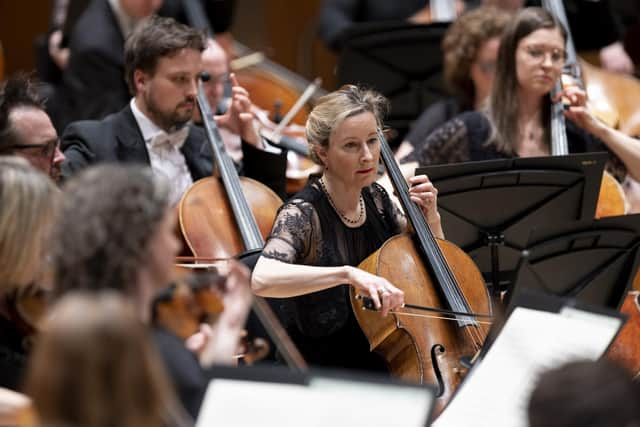Music review: RSNO & Jörg Widmann, Glasgow Royal Concert Hall
RSNO & Jörg Widmann, Glasgow Royal Concert Hall ****
Jörg Widmann is a multi-talented musician who likes to do things differently. Mostly it works and you come away thrilled by an edgy and stimulating experience; occasionally it doesn’t, but you still respect the sincerity of his intentions and come back for more.
On Saturday, the hyperactive conductor-composer-clarinettist (he eschewed the last this time round) was in safe territory directing the RSNO in various pieces by Mozart and in a novelty piece of his own. The latter, his Armonica for Glass Harmonica, an instrument of rarefied popularity invented by Benjamin Franklin during Mozart’s lifetime, introduced us to one of its few modern practitioners, Christa Schönfeldinger.
Advertisement
Hide AdAdvertisement
Hide Ad

It was a splendid sight, this glittering row of glass bowls rotating laterally on a frame similar to a treadle sewing machine, pedalled to operate, the performer’s fingers wetted to create its dreamy angelic thrum. Widmann’s piece is a concentrated amplification of that, a soundscape of gathering surges coloured by the airy, exotic mix of accordion, percussion, keyboards and harp at its heart, intensified by the fuller orchestral palate.
In truth, the solo instrument spent much of the work subsumed, made up for by Schönfeldinger’s later unaccompanied performance of Mozart’s Adagio for Glass Harmonica, even if the curiosity factor still predominated.
Widmann’s Mozart was another story in a programme bookended by his final two symphonies. These were journeys of fresh discovery, starting with an exhilarating performance of the Symphony No 40 in G minor. Widmann exuded a boyish determination, at times leaping from the rostrum, yet restricting his signalling to bold elements of surprise – a countermelody warranting extra emphasis perhaps, or phrase endings tastefully, often eccentrically, teased.
The Jupiter Symphony bore the same electrifying spontaneity, lyrical without languishing, forcefully robust in the Finale’s duelling double fugue.